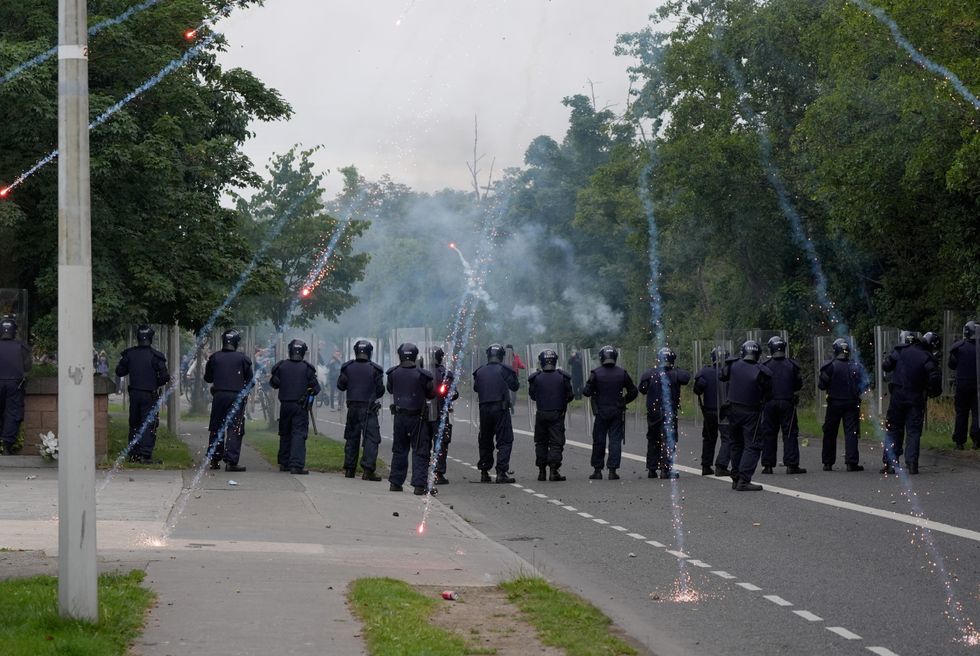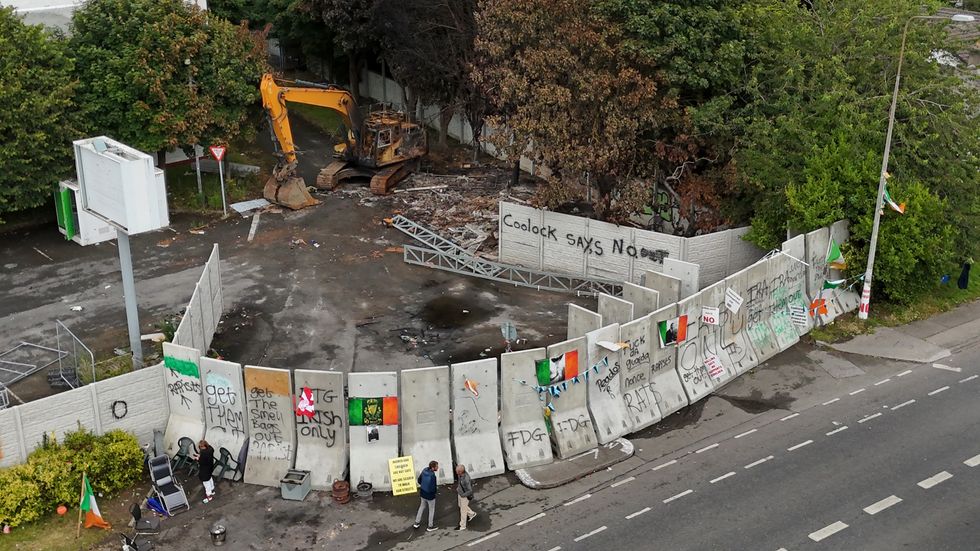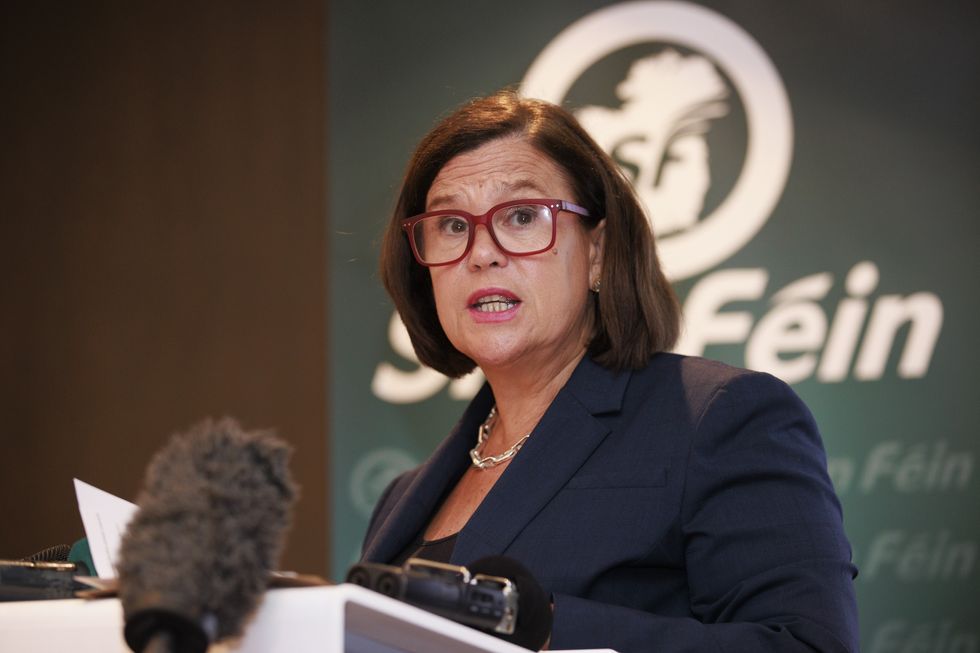Thousands of people are expected to join an anti-immigration protest in Ireland today after weeks of unrest in the North Dublin town of Coolock.
Demonstrations have been taking place at a former paint factory in Coolock after locals opposed its alleged repurposing into a site for asylum seekers.
Over the past three months, the protest outside Coolock’s Crown Paints factory had been mostly peaceful with locals erecting small wooden shacks at the site’s entrance with banners declaring “Coolock Says No” and “Irish Lives Matter.”
But when builders were escorted by the police to the site last Monday morning things quickly turned violent.

Protesters fire fireworks at Garda officers during a stand off after a number of fires were started at the former site of the Crown Paints factory in Coolock
PA
Hundreds of demonstrators assembled at the site hurling abuse at the police and setting fire to mattresses.
Ireland’s Public Order Unit- the riot police- were deployed to control the unrest beating back at the protestors and pepper-spraying the crowd.
The protests of unhappy Irish citizens continued through the week with multiple arson attacks in the area, petrol bombs and fireworks being thrown and three Garda cars damaged with one being set alight.
An Garda Síochána (Irish police) told GB News over 200 officers were deployed in the operation and 32 people were arrested since July 15 of which 22 have been charged. They also said three Gardaí received injuries.
Today, the Garda are prepared to deploy water cannons for the first time in 20 years if the peaceful protest at the paint factory turns violent.
The Garda stated: “The policing activities undertaken by An Garda Síochána in response to evolving events such as public disorder are centred on a graduated approach and a strong tradition of policing by consent.
“As per standard, the recent public order operation in Coolock had an operational command structure in place and was overseen by highly experienced senior officers with advice provided by Gardaí highly trained and experienced in public order policing.”
The extent of the violence at the factory site has reportedly led to crisis talks held between Taoiseach Simon Harris and the leader of the opposition, Sinn Féin’s Mary Lou McDonald.
In their meeting, both Harris and McDonald discussed important issues around “community engagement.”
The riots in Coolock are only the latest in a series of political violence in Ireland, with similar protests happening in Newtownmountkennedy in April and Tallaght in May.

Protestors around the former Crown Paints factory in Coolock
PA
In Newtownmountkennedy, East Wicklow, a fire broke out at a similar site expected to house asylum seekers in April.
The following month, a site in Tallaght, a Dublin suburb, was targeted by two pipe bomb attacks after the area was set to receive 350 asylum seekers.
There have also been several large, peaceful gatherings by local residents who object to asylum seekers being given housing.
In an interview this week with the radio station Newstalk, McDonald argued it is “dangerous and debilitating not to listen to the real experience of marginalised and poorer communities on the ground.”
Coolock is one of Ireland’s most deprived neighbourhoods hit hardest by the influx of asylum seekers.
After the Crown Paints factory shut down in 2016, leaving more than a hundred locals unemployed, the area has been plagued by crime and locals are worried about competing with an additional thousand migrants to access local services.
Tallaght is another poor community on the outskirts of Dublin with under-resourced estates.
Speaking on GB News, Irish political correspondent Ben Scallon claimed that immigration issues have been ongoing for “several years,” due to the “grandiose commitment by government to having a no cap policy when it came to asylum seekers.”
Scallan explained: “They said we will take as many as they can effectively, and were bracing to accept as many as 200,000 asylum seekers entering Ireland.
“For those who don’t know, the Republic of Ireland’s population is just over five million. So 200,000 in a country with a population of that size is astonishing.”
Over 10,600 people applied for asylum in Ireland in the first half of the year and that figure is expected to double by Christmas.
Communities feel like they simply cannot cope with an influx of newcomers as they battle housing shortages, rising fuel bills and a struggling economy.

Sinn Fein President Mary Lou McDonald announced the party would be tightening their stance on immigration
PA
LATEST FROM MEMBERSHIP:
One of Ireland’s most acute crises is its housing emergency caused by a deficit of between 212,500 and 256,000 homes.
High inflation is making private rentals more expensive making it harder to save for a deposit to buy a home leaving hundreds of thousands of young people living with their parents.
Tensions around Ireland’s overwhelmed refugee systems are at the top of the political agenda and post challenges for all parties ahead of the country’s election.
On Tuesday, Ireland’s main opposition party, Sinn Féin, toughened its immigration stance after performing poorly in local and European elections.
The party proposed an audit of local services in any area earmarked for an asylum reception area with locals also being allowed to make submissions on the proposals.
Sinn Féin previously had a lead in the polls but their support collapsed as people turned to government parties and hard-right independent politicians who bested them on immigration.
“We were told in no uncertain terms that people and the communities that we represent weren’t hearing us loudly enough, saying simply that they don’t have the resources, the support that they require,” McDonald said at a news conference.